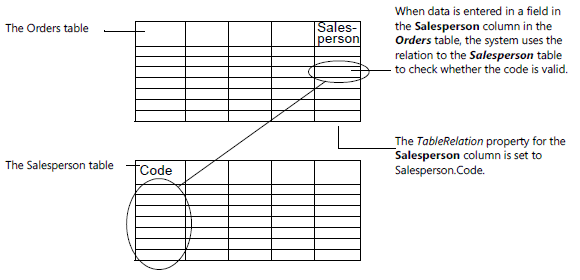Setting Relationships Between Tables
It is common to distinguish among the following types of relationships between tables in relational database design:
One-to-many relationships
Many-to-many relationships
One-to-one relationships
The one-to-many relationship is the most common. If your database design model indicates that you need to set up a many-to-many relationship, then your design is probably inefficient. You can typically break down a many-to-many relationship into two one-to-many relationships. A one-to-one relationship is usually not optimal and can often be avoided by combining the two tables.
Using relationships
If your database contains tables with related data, then you can define a relationship between them. You relate tables by specifying one or more fields that contain the same value in related records. These matching fields often have the same name in each table. You can use relationships to:
Validate data entries
Perform lookup functions in other tables
Propagate changes automatically from one table to other tables
Table relationships and the TableRelation property
Table relationships are defined in the AL Language development environment using the TableRelation property. This property allows you to define both simple and advanced table relations.
Note
You can define a relationship only to a field that is a member of the primary key group.
Advanced table relations are typically prefixed with a conditional statement and include filters. The following syntax is for table relations.
<TableRelation> =
<TableName>[.<FieldName>] [WHERE(<TableFilters>)] |
if (<Conditions>) <TableName>[.<FieldName>]
[WHERE(<TableFilters>)] else <TableRelation>
<Conditions> ::=
<TableFilters>
<TableFilters> ::=
[<TableFilter> {,<TableFilter>}]
<TableFilter> ::=
<DstFieldName>=CONST(<FieldConst>) |
<DstFieldName>=FILTER(<Filter>)
For example:
table 50120 TableWithRelation
{
fields
{
field(1; Id; Integer) { }
field(2; Type; enum TypeEnum) { }
field(3; Relation; Code[20])
{
TableRelation =
if (Type = const (Customer)) Customer
else if (Type = const (Item)) Item;
}
}
}
The following table describes each of the symbols.
| Symbol | Description |
|---|---|
| TableName | Specifies the related table. |
| FieldName | Specifies a field in the related table. |
| Conditions | Table relations can be conditional. |
| TableFilters | A list of table filters. |
| TableFilter | A constant expression or a filter expression. |
| DstFieldName | Specifies the destination field name. |
| Filter | A filter expression, such as 10|20..30. |
Examples of table relationships
For example, you have an Orders table that stores orders and a Salesperson table that stores the names of all salespeople in your company. In the Orders table, you can include a Salesperson field that identifies the salesperson. By setting up a relationship between these two tables, you can check whether the Salesperson field in the Orders table contains a valid code.

For example, you have a Vendors table with all your vendors and a Currency Code table. You can create a relationship between a Currency Code field in the Vendors table and the Currency Code table. This will allow users to look up information about valid currency codes.
Furthermore, if you change one of the currency codes in the Currency Code table, then the change is automatically propagated to all tables that refer to this code.